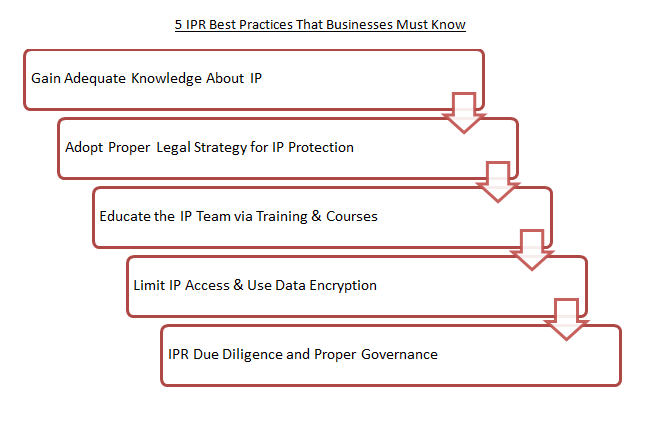IPR Due Diligence: Five IPR Best Practices That Businesses Must Know
Intellectual property (IP) is the fuel that drives IP-centric businesses, whose primary objective is to develop unique IP (inventions, literary and artistic works, designs, symbols, names and images) to boost their growth. However, simply creating intellectual assets is not enough. They must be protected via intellectual property rights (IPR) such as patents, trademarks, trade secrets and copyrights; as they confer certain enforceable exclusive rights upon owners. Therefore, read on to know about the top five IPR best practices that businesses must follow.
What Are Intellectual Property Rights?
The World Intellectual Property Organization (WIPO) defines IP as a creation of the mind, including inventions, designs, symbols, and more. Therefore, IPRs are legal rights that protect such intellectual property from duplication and other forms of exploitation.
Need for IPR Best Practices
Organizations must follow IPR best practices for success and safety, especially when IP litigation rates are increasing significantly. These IPR best practices define key strategies that an organization must adapt to identify and protect their IP to avoid legal challenges in future.
Table of Contents
5 Key IPR Best Practices

1. Gain Adequate Knowledge About IP:
Anything that an organization creates may be eligible for protection. Once a company identifies the type of IP it owns, it must decide what kind of protection suits it best. An organization must have precise knowledge of its IP as it is vital to define what is included in it clearly. It enhances the development and protection of IP.
2. Adopt Proper Legal Strategy for IP Protection:
It is now common for companies to enter into non-disclosure agreements, employment agreements, and invention disclosure agreements with specific parties to protect their confidential information.
To enhance IP protection, an organization’s legal department must also take the necessary steps to document its IP protection policies. Clear and concise documentation can play a decisive role in the case of disputes, especially those related to the infringement of trade secrets.
3. Educate the IP Team via Training and Courses:
While working in an organization, an employee gets access to several IPs, which are highly confidential. Therefore, companies must ensure that each entity connected with their IP knows why and how intellectual property should be protected.
Through constant training and courses, an organization can periodically reinforce confidentiality policies. The organization must regularly communicate the value of IP protection and educate people on the right ways of handling IPs. These trainings should also include key stakeholders, business partners, and customers.
4. Limit IP Access and Use Data Encryption:
It is always advisable to limit access to confidential information. The parties with access to IP must enter into an agreement covering clauses and circumstances related to non-competition and non-disclosure.The organization must always ensure their IP access is limited only to authorized individuals. Also, they must be aware of the parties and people who have specific administration and user access rights.
Similarly,data encryption prevents unauthorized access to a company’s network. Businesses must have properly licensed software to encrypt the files, emails, and drives.
5. IPR Due Diligence and Proper Governance:
IPR due diligence describes the efforts and necessary steps that an organization needs to take for protecting and enforcing its IP. Businesses must conduct periodic audits to determine their IP assets and the risks associated with them. It is required that they take necessary actions at appropriate levels to protect those assets against infringement.
Properly designed IP audits throw light on existing IP portfolios and alert the organization if any changes are required. These audits also help them formulate a plan by predicting the relevance of IP in future, allowing them to avoid legal disputes.
It is essential to stay updated in terms of the latest IPs in force. These audits are also important to make an informed decision about a future exit strategy; in case an IP transfer occurs because of a merger or acquisition.
Conclusion
A solid legal strategy combined with good business practices is vital for keeping a company’s IP confidential. Owning an IP while adopting these best IPR practices can help businesses create their brand or product; earn a good market reputation and generate new revenue sources if IP is licensed to third parties. A well-protected IP is also counted as an asset when a company’s value is determined. Similarly, it can also be used as collateral for a loan.
Sagacious IP assists customers with effective intellectual property management solutions to help them protect their IP adequately and avoid legal disputes. With a stringent policy to uphold intellectual property rights, we strictly adhere to non-disclosure agreements.
-The IPMS and Editorial Team
Having Queries? Contact Us Now!
"*" indicates required fields




